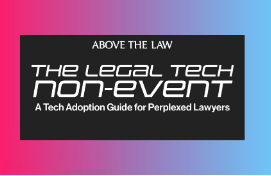 At one time, lawyers and law firms could not legally promote their services through advertising. With these restrictions lifted, law firms may now advertise, and lawyers have definitely embraced digital marketing. Online advertising can amp up law firm business, gather more referrals and promote a law firm’s unique services. However, with the new surge in digital marketing comes the reminder that ethics must be present in every aspect of a law firm’s business. The legal industry faces constant changes in ethics guidelines, but law firms still must keep in step with ethics in their legal marketing efforts.
At one time, lawyers and law firms could not legally promote their services through advertising. With these restrictions lifted, law firms may now advertise, and lawyers have definitely embraced digital marketing. Online advertising can amp up law firm business, gather more referrals and promote a law firm’s unique services. However, with the new surge in digital marketing comes the reminder that ethics must be present in every aspect of a law firm’s business. The legal industry faces constant changes in ethics guidelines, but law firms still must keep in step with ethics in their legal marketing efforts.
History of Ethics in Law Firm Marketing
In 1977, the Supreme Court ruled in Bates v. State Bar of Arizona that guidelines restricting attorney advertising were unconstitutional. Since then, it has become common for law firms to advertise their legal services. However, there are still regulations. In the publication Model Rules of Professional Conduct (MRPC), the American Bar Association has outlined the ethical boundaries for legal professionals, and most states pattern their own unique guidelines after it.
Tips for Ethics in Law Firm Marketing
If there is a violation of ethics in law firm marketing, there may be serious consequences. These may take the form of fees, expensive domain changes, and malpractice assertions. To stay effective and minimize problems, it is best to stay aware of your state’s ethics rules for law firm marketing. If you are wondering about what is allowed and what is out of bounds, you are not alone. States vary when it comes to ethics rules in law firm marketing, but most states mimic the ABA’s Model Rules, with some variations. In order to avoid breaching ethics rules, consider the following general guidelines, but always remember that your state’s rules may vary.
Monitor Your Website
If you already have a website in place, you may already know that there are some claims to avoid on your law firm website, so take time to examine what is displayed on your pages, on social media, on your blog, and on any printed material or email correspondence. Some state guidelines prohibit using professional models in website photos, mandating that photos should only include the actual team members of your law firm. Video scenarios that reconstruct car crashes or accidents must follow certain regulations before being included on your law firm website. Check out your state’s rules on using certain phrases, images and photos on your company’s website.
Heed Client Wishes
Perhaps you have contacted prospective clients through a mailing or email newsletter, and they have requested to stop sending material. If this is the case, ethics rules mandate that your law firm honor their wishes. Even if they initially gave their address in exchange for something, your law firm is still required to remove this individual off your contact list as they requested.
Label Ads
Confirm that your ads are straightforward and avoid creating material that is misleading in any way. Any statistics given should be verifiable. Marketing materials should be labeled as advertising on the outside of the envelope, or at the beginning and end of every email marketing message.
Post Testimonials Carefully
Ethics violations commonly happen with client testimonials. The best way to avoid these is to steer clear of the following:
- Anonymous client testimonials
- Implications that any future client will have similar results
- Paying a client to give a testimonial
- Fabricated information in a client story
- Exaggerated facts within the testimonial
- Facts that cannot be confirmed
Always Add a Disclaimer
A good way to avoid problems is to consistently add a disclaimer to every client testimonial. It is crucial to stress that each client has a different situation and a unique case outcome, and no attorney can promise similar results as that of previous clients. Although you must follow your unique state guidelines, a sample disclaimer might look like this:
- “No law firm can promise the same results as that of previous clients.”
- “Hear what our clients have said about their unique situations.”
- “Your case is unique and our attorneys cannot promise you the same results.”
Do Not Use Comparative Statements
State guidelines also govern comparative statements that law firms make about themselves and other law firms statements are tricky, because they often make unverifiable claims, and using these may lead a law firm into “misleading” territory. Try to avoid using comparative statements such as:
- “Our law firm works harder than anyone else in the Tri-State area.”
- “XYZ is the most aggressive defense firm in the region.”
- “We are the #1 bankruptcy law firm in the state.”
Watch Your Bio and Business Cards
You may not know it, but your bio and business cards may contain material that qualifies as an ethics violation. An online attorney bio can list a few successful cases, but adding a disclaimer might prevent a misunderstanding from potential clients who want the same results from you. If you ever mention a past case in your bio, be sure to get client consent first. With business cards, stay with your simple contact information, and avoid potentially misleading slogans or taglines. For both business cards and bios, do not use the word “expert” or claim that you are a “specialist” or “certified” unless you can prove it with a document.
Monitor Your Social Media
Law firms are diving into social media as part of a savvy marketing plan, but every legal professional still needs to bring ethics onto social media platforms. When posting on social media, always remember to avoid exaggerated claims and carefully protect all client information. Repeatedly remind your audience that your legal tips and answers do not constitute an attorney / client relationship. If possible, it may be wise for your company to hire a social media specialist, in order to vigorously monitor both the legal and technical aspects of your law firm’s social media engagement.
Avoid Spam
Some define spam as “unsolicited internet material, typically sent for the purpose of advertising, and often sent to many recipients at the same time.” As a law firm that wants to avoid ethics problems, do not send material that might be considered spam, and always give recipients a clear way to unsubscribe if they wish. Since ethics rules keep changing, remember to track ongoing changes by viewing the ABA website.
Conclusion
Law firms enjoy the benefits of digital marketing, and for good reason. Marketing can boost a business with new leads, contacts and clients. But legal marketing has its own ethical pitfalls to avoid, so stay in step with your state guidelines, and keep watching for changes in the rules for legal marketing. Steering clear of ethics boundaries helps you avoid problems later, retains your clients’ trust, and keeps your law firm aimed at future success.
This Week’s Action Step:
- Examine the ethics rules on the ABA website and get to know your state’s guidelines.
 Annette Choti graduated from law school 20 years ago, and is now the CEO & Owner of Law Quill, a legal digital marketing agency focused on small and solo law firms. Law Quill is the only legal digital marketing agency that provides unique, SEO-optimized content, pre-packaged content, and courses for lawyers to learn SEO themselves through Law Quill Academy. Annette used to do theatre and professional comedy, which is not so different from the legal field if we are all being honest. Annette can be found on LinkedIn or at annette@lawquill.com
Annette Choti graduated from law school 20 years ago, and is now the CEO & Owner of Law Quill, a legal digital marketing agency focused on small and solo law firms. Law Quill is the only legal digital marketing agency that provides unique, SEO-optimized content, pre-packaged content, and courses for lawyers to learn SEO themselves through Law Quill Academy. Annette used to do theatre and professional comedy, which is not so different from the legal field if we are all being honest. Annette can be found on LinkedIn or at annette@lawquill.com









